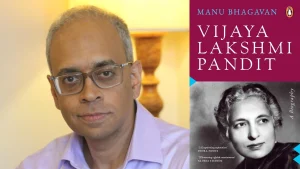
Professor Manu Bhagavan was embarrassed.
It was early in his tenure with Hunter College’s history department and a colleague had presented him with a book that had nothing to do with contemporary India, his primary area of study and expertise. He was told that he might find it interesting because of the significant amount of time given to a woman named Madame Vijaya Lakshmi Pandit.
He knew her to be the sister of former Indian Prime Minister Jawaharlal Nehru, but very little else.
In December of 2023, nearly twenty years after Professor Bhagavan was introduced to the remarkable life of Madame Pandit – a prolific politician, diplomat and anticolonialist of the twentieth-century – he published her biography.
Since its release, the book Vijaya Lakshmi Pandit: A Biography has risen to No. 3 on India’s Asian Age nonfiction bestseller list, and has received attention from notable historians, writers, economists, and film directors, such as Romila Thapar, Alan Seeley, Kaushik Basu, and Deepa Mehta.
Most important, though, was the approval of Nayantara Sahgal, Madame Pandit’s 96-year-old daughter, who spoke at a book launch event in Dehradun, India. Along with the rest of her family, of the prominent Nehru-Gandhis, Sahgal cooperated with Bhagavan throughout the writing process, but encouraged him to tell her mother’s story in his words, truthfully.
“They never saw what I wrote,” said Bhagavan, Professor of History at Hunter College.
“They never told me what to write; in fact, they insisted that I write whatever I saw as the truth and not hide anything. They just asked that I be as truthful as possible, but they never asked to see anything.”
The highlight for Bhagavan during his ten-day book tour in India at the end of December was the time he spent with Sahgal. Despite her age, the celebrated writer attended his day-long event, spoke, listened attentively and then joined him for dinner where they even shared a glass of whiskey.
“It was just remarkable. There’s no other way to describe it. She’s incredible, which, of course, matches every description of her,” Bhagavan said.
“The legacy of Sahgal’s mother suffered from deliberate attempts by opponents to erase and diminish her achievements, a reason why Bhagavan was not originally aware of her, and why, despite her enormous contributions to the world, many shared his negligence.”
The biography took eight years, used material from five different languages and seven countries, and employed over forty archives. Several Hunter College students contributed as research assistants, for which Bhagavan attested to being “extremely grateful.”
But it wasn’t just his appointed researchers who helped. His history students in general were key contributors, allowing him to engage in important conversations within the classroom.
“The classroom is intended as a learning environment for students,” said Bhagavan. “But the best experiences occur when the instructor is also learning.”
Professor Bhagavan said that if there was one thing he’d like his readers to take away from Madame Pandit’s biography, it would be inspiration.
“It’s a book that speaks very much to the now. There are many things in the book that are just so relevant today. One being, for example, the defense of democracy across the board,” he said.
